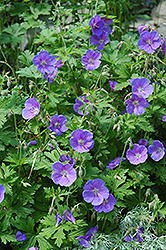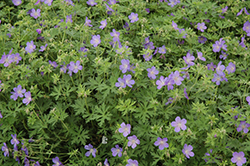Height: 24 inches
Spacing: 20 inches
Sunlight:
![]()
![]()
Hardiness Zone: 2a
Other Names: Hardy Geranium
Description:
Spreading mounds of deep green foliage are covered in blue flowers with white centers; compact habit with excellent drought tolerance once established; foliage turns a lovely red during the cooler autumn months; great for beds, borders and containers
Ornamental Features
Johnson's Blue Cranesbill has masses of beautiful blue cup-shaped flowers with white eyes at the ends of the stems from late spring to late summer, which are most effective when planted in groupings. Its deeply cut lobed palmate leaves are dark green in colour. As an added bonus, the foliage turns a gorgeous red in the fall.
Landscape Attributes
Johnson's Blue Cranesbill is an herbaceous perennial with a mounded form. Its relatively fine texture sets it apart from other garden plants with less refined foliage.
This is a relatively low maintenance plant, and should only be pruned after flowering to avoid removing any of the current season's flowers. Deer don't particularly care for this plant and will usually leave it alone in favor of tastier treats. It has no significant negative characteristics.
Johnson's Blue Cranesbill is recommended for the following landscape applications;
- Mass Planting
- Rock/Alpine Gardens
- Border Edging
- General Garden Use
- Container Planting
Planting & Growing
Johnson's Blue Cranesbill will grow to be about 24 inches tall at maturity, with a spread of 24 inches. When grown in masses or used as a bedding plant, individual plants should be spaced approximately 20 inches apart. Its foliage tends to remain dense right to the ground, not requiring facer plants in front. It grows at a medium rate, and under ideal conditions can be expected to live for approximately 10 years. As an herbaceous perennial, this plant will usually die back to the crown each winter, and will regrow from the base each spring. Be careful not to disturb the crown in late winter when it may not be readily seen!
This plant does best in full sun to partial shade. It is very adaptable to both dry and moist locations, and should do just fine under typical garden conditions. It is not particular as to soil type or pH. It is somewhat tolerant of urban pollution. This particular variety is an interspecific hybrid. It can be propagated by division; however, as a cultivated variety, be aware that it may be subject to certain restrictions or prohibitions on propagation.
Johnson's Blue Cranesbill is a fine choice for the garden, but it is also a good selection for planting in outdoor pots and containers. It can be used either as 'filler' or as a 'thriller' in the 'spiller-thriller-filler' container combination, depending on the height and form of the other plants used in the container planting. It is even sizeable enough that it can be grown alone in a suitable container. Note that when growing plants in outdoor containers and baskets, they may require more frequent waterings than they would in the yard or garden.
Disclaimer - This resource is provided for informational purposes only and does NOT reflect current availability. Inventory varies seasonally, so we cannot guarantee that every plant will be in stock at all times - please contact your favourite GardenWorks location directly for current availability. It does not include our entire inventory of plants, so be sure to visit GardenWorks to see varieties that may not be represented on this list.


